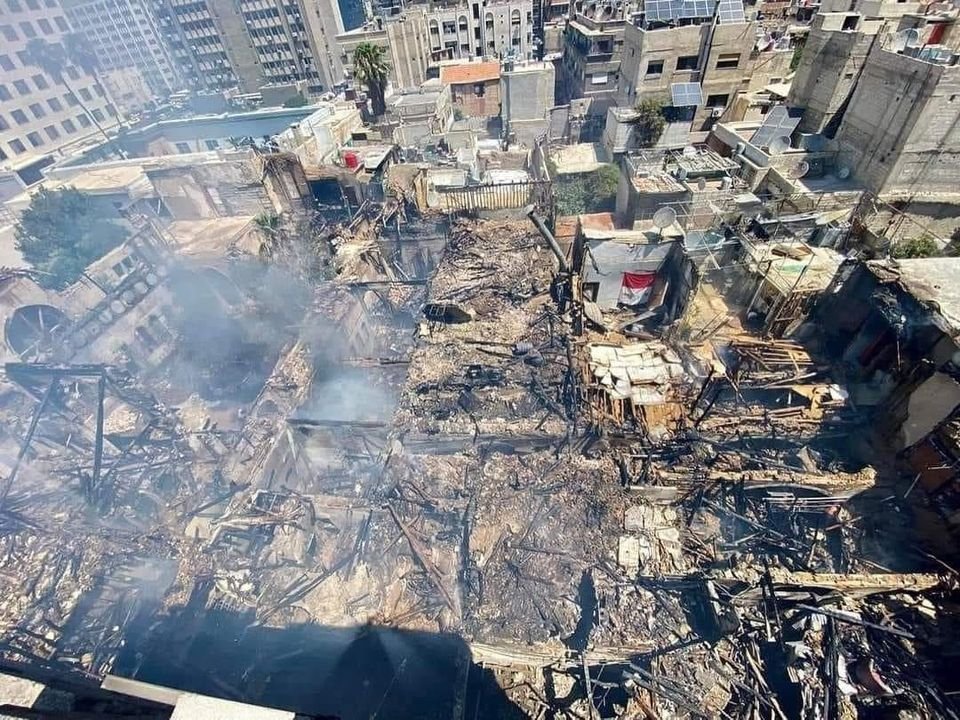
Writer: Ahmad Essa
Once a shining jewel in the Levant’s crown, Damascus has plummeted into a rapid downward spiral under the oppressive rule of Bashar al-Assad, leaving its inhabitants gripped by despair and hopelessness. A dozen years of war have inflicted severe wounds, worsened by the Assad regime’s ineptitude, mismanagement, lack of basic services and infrastructure, hyperinflation, insecurity, rising crime rates, and rampant exploitation.
For more than a decade, this once historic city has consistently ranked as the least livable city in the world on the Economist’s livable city index. Out of 173 cities assessed based on stability, healthcare, culture, environment, and education – all of which Assad has decimated – Damascus stands as a microcosm of the entire country. Its afflictions and decay mirror those that plague every region under the regime’s control, foreshadowing the fate that awaits the nation if it remains in the grip of the regime.
Assad’s Ailing Economy
The Assad regime’s control over vast swathes of the country, including major cities like Damascus and Aleppo, has failed to alleviate the economic crisis consuming Syria. Instead, these areas have witnessed a stark decline in living standards, with inflation rates skyrocketing and basic necessities becoming scarce.

In a recent Foreign Policy article, analyst Charles Lister delved into the regime’s role in the faltering economy, asserting that it is “systematically corrupt, incompetent, and driven by greed rather than the public good.” He emphasized that Assad’s preoccupation with the narcotics trade and gross mismanagement have effectively crippled Syria’s economy.
As the Syrian Pound (SYP) continues its freefall and the economy’s future hangs in uncertainty, the Syrian people – particularly those under the Assad regime’s yoke – bear the brunt of the crisis. Basic necessities have transformed into unaffordable luxuries as prices spiral out of control. The cost of living in this once-thriving city has become insufferable for its residents, leaving them to make heart-wrenching decisions each day. In the 90 days following Assad’s return to the Arab League, the SYP lost a staggering 77% of its value.
A resident of Damascus, in a poignant remark, mockingly recited the words of former Trade Minister Omar Salem: “If a citizen carefully chooses the place from which he will buy his things, his salary will suffice him.” The resident then adds, “Please come and teach us how the salary will suffice us.” Today, half of the average government employee’s 150,000 SYP ($11) salary would barely cover the cost of a traditional Friday brunch ($5.60).
Powerlessness of the People
The regime’s inability to adequately address the city’s needs has led to a monumental breakdown of essential services, leaving the population grappling with incessant power outages and unreliable access to electricity – a dilemma that plagues Syria as a whole. Even in Damascus, electricity is only available for a mere 30-45 minutes every six or seven hours.
While many in the liberated north have devised alternative systems, such as privately or communally owned generators, wind or solar-generated power, or the restoration of local infrastructure to import electricity from neighboring nations. Innovative projects like the Green Energy company provide 24 hour electricity service to over 70% of greater Idlib with 95% of liberated north-western Syria projected to receive service by the end of 2023. Meanwhile, the Assad regime has fallen short in meeting the requirements of its capital, let alone the entire country.
The regime’s authoritarian fixation on total control has stifled reconstruction, imposing exorbitant economic barriers on the use of private or communal generators, as well as renewable energy sources like solar power. High fees, taxes, fines, and threats of legal action against “violators” have compelled many to either risk consequences or endure powerlessness.
The supply of electricity in regime-controlled regions has dwindled in recent months due to irregular fuel provision and declining natural gas reserves. Iran’s withholding of fuel for political leverage, coupled with the regime’s negligence in repairing and maintaining damaged electrical infrastructure over the years, has contributed to this decline.
Electricity shortages have compounded the challenges of an ailing economy, hampered normal business operations and led to decreased domestic economic activity and investment. Many of these issues are further exacerbated by the regime’s avarice. Notably, the Ministry of Energy has granted special licenses for private generators to sell electricity to regime-affiliated individuals, such as Maher Assad, whose Fourth Division holds exclusive rights to “private” electricity sales in much of Aleppo.
On the Precipice of Chaos
Amid the economic failure and crumbling infrastructure, security in regime-held areas has rapidly deteriorated. Daraa, in the south, has remained mired in constant chaos, violence, and insecurity since its 2018 “reconciliation” efforts. In recent months, bombings, violence, assassinations, vocal public protests, and criticism have reached the capital, echoing a level of unrest not witnessed since the early years of the revolution.

On July 25, an improvised explosive device (IED) detonated near the shrine, injuring two people. Just two days later, on July 27, another IED exploded, claiming six lives and leaving over twenty wounded. The attacks targeted a location “near a security building around 600 meters from the [site].”
Merely last month, violence and clashes erupted in Jaramana, a Damascus suburb. Streets were blocked, and looting ensued. Reports circulated that some participants in the crowds chanted anti-government slogans.
Corruption Nurtures Dissent
The pervasive cronyism and exploitation propagated by the Assad family, their allies, and the elite have amplified public outcry, even among those who once staunchly supported the regime. The regime’s unyielding grip on power has fostered a system that rewards loyalty and punishes dissent. Cronies and associates thrive, while the majority of the populace languishes under their oppressive rule. This cronyism has not only hindered progress but also cultivated an atmosphere of resentment and injustice.
Nisreen al-Zarei, a researcher, aptly described this systemic cronyism: “The state in Syria has utterly collapsed… the regime is focused on upholding a ‘repressive police structure’ without any regard for citizens’ well-being, which has been entirely forsaken in favor of dubious business networks linked to the ruling family.”
In this climate, dissent festers. Criticism of the Assad regime has become widespread, even among its staunchest supporters, such as writer Lama Abbas, as well as former and current military and government personnel. The bulk of this criticism centers around the dire economic situation, corruption, and the regime’s failure to bring about improvement.
Displeasure has even penetrated the heartland of Assad’s support: Latakia, the Alawite stronghold. Security forces in Latakia recently initiated a wave of arrests targeting individuals accused of “undermining the state’s prestige and the nation’s psyche.” These individuals had posted on social media, expressing discontent with the unbearable living conditions, persistent power outages, and calling for sit-ins to demand change.
A Grim Example

The unendurable conditions prevailing in Assad-controlled regions – characterized by a dearth of basic services, hyperinflation, insecurity, surging crime rates, cronyism, and exploitation – serve as an ominous preview of what awaits the entire nation under Assad’s leadership. This situation urgently underscores the imperative to break free from the cycle of mismanagement and embrace a path toward genuine progress and prosperity.
In a televised interview, a resident of Damascus encapsulated the height of desperation: “The citizens are selling their houses in order to be able to send their sons abroad, or in order to feed and water their families.” This desperation, not stemming from the bombs and planes of Russia, but from the inept and corrupt shadow of Assad’s rule, illustrates the depth of the crisis.









